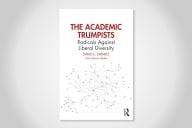You have /5 articles left.
Sign up for a free account or log in.
We’ve all seen it: the panel or paper contorted to fit within the boundaries of disciplinary conference theme. Credit to the moderator or panelist for trying. But, save a title or a few paragraphs, it has glaringly little to do with the given topic.
The American Historical Association has had enough this bending and twisting of research. So the association recently said that its 2020 annual conference will have no theme at all, for the first time in nearly two decades.
"Next year, no one will be tempted to engage in misguided and pointless gymnastics to make a panel appear to fit a theme,” John R. McNeill, the association’s president-elect and University Professor of History at Georgetown University wrote in his announcement of the decision. “I hope that a themeless AHA will prove to be a maximally inclusive AHA. There will be no cluster of sessions devoted to ‘War and Peace,’” a reference to the 2004 theme, “or ‘Uneven Developments’ (2008) or to anything else.”
No one will discount their 2020 submission ideas for lack of relevance to a theme, McNeill said, and practitioners “of every variety of history should feel equally encouraged to try their luck.” As a result, he added, “the assortment of topics represented by the sessions should be entirely random” and “represent a fuller array of all the approaches, methodologies, topics and, yes, themes that historians nowadays find compelling.”
McNeill said via email last week that he couldn’t immediately recall specific examples of tenuous panels, but that two years on the conference program committee left him with “the impression that people were attempting useless acrobatics.”
Underscoring a point that McNeill made in his announcement, James Grossman, executive director the AHA, said the association makes it clear in its annual call for papers that they are not assessed by relevance to a theme (the association does not accept individual papers, just panel pitches). But while adherence to the topic is optional, it seems that members remain skeptical that catering to a theme won't help them, he said.
“We get proposals that do backflips to relate the true focus of the panel to the theme,” Grossman added. And session titles “that are bent backwards and sideways to incorporate a word from the theme.”
Themes are not all bad: McNeill said in his announcement that part of the reason 2020 will be themeless is that so many good ideas have been taken. “Had the AHA known what was coming,” he said, it might have held off on using “Practicing History in Unsettled Times” in 2007. McNeill also praised 2015’s theme, “History and Other Disciplines,” and even this year’s, “Race, Ethnicity, and Nationalism in Global Perspective.”
More “fundamentally,” however, McNeill said, “I wonder what good it does to have a theme.” He guessed he, too, might have been guilty of “contortions” to fit a theme “back in the day,” but that he now recognized all such efforts as “pointless.”
Pulling Things Together
Assuming that themes do offer some guidance, or at least guidance to some, what will guide the 2020 conference? Grossman said “major threads” will come from two plenary sessions.
Other threads will remain loose. And that could be the case beyond 2020: Grossman also said a themeless 2021 meeting is under discussion.
Other disciplinary group meetings have long gone without themes. The American Psychological Association hasn’t had one for more than a decade, at least, said Kim Mills, organization spokesperson. That’s because the association’s 54 divisions each get a certain number of programming hours, and typically devote them to their respective subfields, Mills said. The result is a “large and very diverse program.”
Mills didn’t rule out a more thematic approach to future conferences, however, such as a possible themed day.
Some organizations are more committed to banners. The American Geophysical Union, for example, has had themed fall meetings, at least of late. Last year’s topic was “What Will You Discover?” This year’s upcoming meeting is “What Science Stands For.” Chris McEntee, the union’s executive director, said the group uses themes to “frame the meeting around the issues we know our attendees and the broader Earth and space science community are most concerned about.”
Sebastiaan Faber, chair of Hispanic studies at Oberlin College, said he thought it made “perfect sense” to hold a themeless conference, especially for “massive” professional meetings. At these large conferences, he said, overarching themes “seem a bit meaningless and invite a kind of opportunism -- although they are often so broadly formulated that they can accommodate almost anything.”
At smaller meetings, however, where most everyone attends most sessions, Faber said he thought predefined themes “can be quite productive.”
Flagging the fact that he’s not an historian, Faber said McNeill’s explanation “makes you wonder why large professional organizations in the humanities and social sciences decided to give their conferences overarching themes to begin with.” He guessed that it might have stemmed from the anxiety wrought by increasing “specialization, fragmentation and interdisciplinarity” from the 1970s and 1980s. Why? Those trends undermined the notion that “scholars in the same field could automatically be assumed to be part of a common pursuit,” he said.
Faber mused, “Maybe the loss of this assumed disciplinary coherence or the sense of a common pursuit sparked a search for other types of coherence.”
That hypothesis at least fits with McNeill’s mini-history of AHA conference themes. For its first 100 or so annual meetings, he said, beginning in 1884 in Saratoga, N.Y., “the AHA did not bother with themes. They gradually took hold in the 1990s, if we can trust the admittedly incomplete archival record.” Then, for a while, themes were optional. The 1994, 1995 and 1998 meetings went themeless. The last year without a theme was 2003.
Joshua Eyler, director of the Center for Teaching Excellence at Rice University (and an occasional columnist for Inside Higher Ed), said he was recently chatting with colleagues about how very common the “stretching phenomenon” is.
“Although some themes are urgent and important, many cause potential attendees to force their ideas into a predetermined box, so to speak,” he said.
Patrick Manning, Andrew W. Mellon Professor of World History, emeritus, chose “Scale in History” for 2017’s AHA conference, when he was association president. The idea, he said, was to ask participants to “stretch” their papers to fit the theme, or, “really, to stretch their paper by articulating the scales they were using,” such as local to global or small scale to large scale. He said quite a few participants appeared to do that, and that he’s interested to see if they continue to do so over time.
On the topic of themes, Manning said he’s interested in whether history might appoint a group to identify the “main topical and interpretive directions of the field, and to comment on implications of those directions,” and maybe make recommendations. He said he’s recently written about the idea of “historical theory,” a parallel to literary theory.
Still, Manning said he wasn’t “worried” about no theme for AHA in 2020.
History “addresses a very wide range of topics, and the [conference] program committee seeks to provide space for as many as possible,” he said. So while the absence of a formal theme likely won’t make much of a difference, it's “an interesting experiment.”









